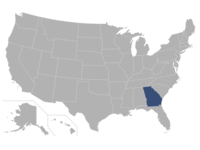Georgia lawmakers poised to create oversight panel with power to remove local prosecutors

Momentum continues to build in the Georgia Legislature for a proposed law that could allow state officials to remove district attorneys from office for misconduct.
The Georgia House moved a step closer this week to establishing a prosecutor oversight commission, the first of its kind in Georgia, as the House Judiciary Committee passed Senate Bill 92 along a party line vote on Wednesday.
The Republican-backed bill is now set to go before the gatekeeping House Rules Committee, which determines which bills can make it to the floor for a vote. The 2023 legislative session ends on March 29.
Sen. Randy Robertson, a Catuala Republican, said the measure aims to hold local prosecutors accountable in a similar manner to judges, who are subject to investigation by the state’s Judicial Qualifications Commission. Georgia sets a high bar for police officer’s conduct, which results in more officers being decertified than in any other state.
“The criminal justice system is under oversight whether you’re a deputy sheriff working in a rural county or you’re a police officer with the Atlanta Police Department,” Robertson said. “There are multiple layers of opportunities to have your actions reviewed, studied and corrected.”
“I’ve watched judges who chose to do things their way as opposed to the way things were supposed to be done who retire and leave the job because they failed to meet that high standard,” Robertson said.
In 2020, Democrats proposed the creation of a similar committee following allegations of improper handling and eventual criminal indictment of the local prosecutor who initially took charge of investigating the shooting death of Ahmaud Arbery, a 23-year-old Black man killed by three white men while jogging in a Brunswick-area neighborhood.
At the time, Republicans dismissed Democrats’ proposals to form a new commission that would weed out problematic prosecutors or at least dole out some form of punishment to district attorneys who didn’t meet the proposed standards.
In recent months, some Democratic legislators and prosecutors have questioned whether Republican legislators’ support of more prosecutorial oversight is related to political reasons instead of serious concerns about district attorneys abusing their authority.
They point to the fact that in the 2020 election, a record number of non-white women were elected as district attorneys in Georgia.
About two dozen of Georgia’s district attorneys and solicitors have signed a letter supporting the oversight commission. The proposal, however, is opposed by the state’s prosecuting and district attorney associations, which complain a state oversight panel could unfairly target local prosecutors for making independent judgments about which types of cases should be pursued.
Opponents also argue that the legislation is unnecessary since voters already can decide whether district attorneys are re-elected and prosecutors who break the law face criminal charges.
Fulton County District Attorney Fani Willis, who is pursuing a probe of former President Donald Trump, has complained the legislation is an overreaction.
Similarly, House Bill 231 establishes a new board which determines the consequences of prosecutors declining to prosecute low-level offenses.
A district attorney or solicitor general could be removed under the proposed law for willful and prejudicial misconduct as well as physical or mental disabilities that inhibit their ability to prosecute cases.
Under HB 231, the Georgia Supreme Court would appoint a five-member investigative panel and three-member hearing panel. Robertson’s plan calls for Georgia’s legislative leadership to choose the members.








